Fiat Ducato vs Kia Stonic – Differences & prices compared
Compare performance, boot space, consumption and price in one view.
Find out now: which car is the better choice for you – Fiat Ducato or Kia Stonic?
The Fiat Ducato (Cargo Van) comes with a Diesel or Electric engine and Manuel or Automatic transmission. In comparison, the Kia Stonic (SUV) features a Petrol or Petrol MHEV engine with Manuel or Automatic transmission.
When it comes to boot capacity, the Fiat Ducato offers , while the Kia Stonic provides 352 L – depending on how much space you need. If you’re looking for more power, decide whether the 270 HP of the Fiat Ducato or the 100 HP of the Kia Stonic suits your needs better.
In terms of consumption, the values are 7.20 L per 100 km for the Fiat Ducato, and 5.50 L for the Kia Stonic.
Price-wise, the Fiat Ducato starts at 34200 £, while the Kia Stonic is available from 19400 £. Compare all the details and find out which model fits your lifestyle best!
Fiat Ducato
The Fiat Ducato is a versatile vehicle that has remained popular among business owners and adventurers alike. With its spacious interior and practical design, it is ideal for transporting goods or converting into a camper van for travel enthusiasts. Its robust performance and reliability have solidified its reputation as a staple in the commercial van market.
detailsKia Stonic
The Kia Stonic is a compact crossover that seamlessly blends bold design with practical functionality. Its distinctive, eye-catching exterior is complemented by a well-crafted interior offering a comfortable ride and intuitive technology for today's drivers. The Stonic is perfect for urban environments, providing agility and efficiency without compromising on style or performance.
details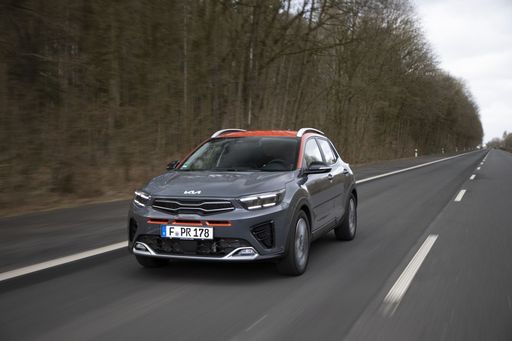 @ press.kia.com
@ press.kia.com
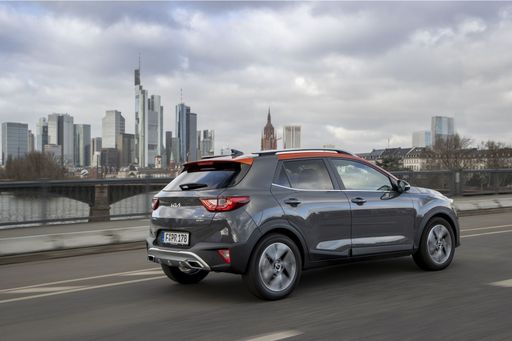 @ press.kia.com
@ press.kia.com
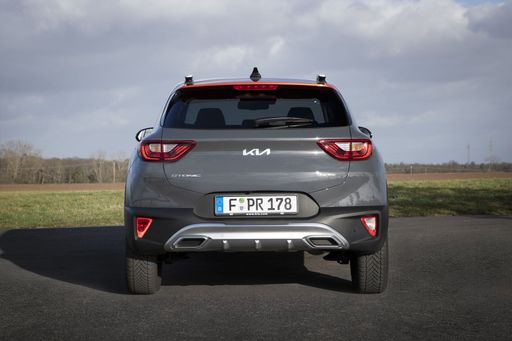 @ press.kia.com
@ press.kia.com
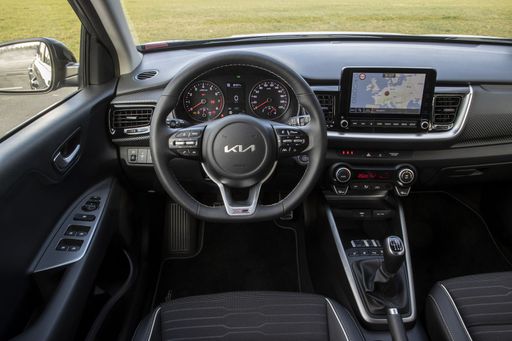 @ press.kia.com
@ press.kia.com
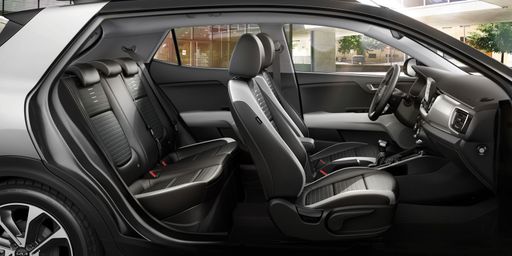 @ press.kia.com
@ press.kia.com

|
|
|
|
|
Costs and Consumption |
|
|---|---|
|
Price
34200 - 57800 £
|
Price
19400 - 25600 £
|
|
Consumption L/100km
7.2 - 9.3 L
|
Consumption L/100km
5.5 - 5.7 L
|
|
Consumption kWh/100km
-
|
Consumption kWh/100km
-
|
|
Electric Range
430 km
|
Electric Range
-
|
|
Battery Capacity
-
|
Battery Capacity
-
|
|
co2
0 - 244 g/km
|
co2
125 - 129 g/km
|
|
Fuel tank capacity
90 L
|
Fuel tank capacity
45 L
|
Dimensions and Body |
|
|---|---|
|
Body Type
Cargo Van
|
Body Type
SUV
|
|
Seats
3
|
Seats
5
|
|
Doors
4
|
Doors
5
|
|
Curb weight
2075 - 2940 kg
|
Curb weight
1195 - 1260 kg
|
|
Trunk capacity
-
|
Trunk capacity
352 L
|
|
Length
5413 - 6678 mm
|
Length
4140 mm
|
|
Width
2050 - 2100 mm
|
Width
1760 mm
|
|
Height
2254 - 2774 mm
|
Height
1505 mm
|
|
Payload
560 - 2020 kg
|
Payload
450 - 455 kg
|
Engine and Performance |
|
|---|---|
|
Engine Type
Diesel, Electric
|
Engine Type
Petrol, Petrol MHEV
|
|
Transmission
Manuel, Automatic
|
Transmission
Manuel, Automatic
|
|
Transmission Detail
Manual Gearbox, Automatic Gearbox
|
Transmission Detail
Manual Gearbox, Dual-Clutch Automatic
|
|
Drive Type
Front-Wheel Drive
|
Drive Type
Front-Wheel Drive
|
|
Power HP
120 - 270 HP
|
Power HP
100 HP
|
|
Acceleration 0-100km/h
-
|
Acceleration 0-100km/h
11.3 - 12.4 s
|
|
Max Speed
130 - 165 km/h
|
Max Speed
176 - 179 km/h
|
|
Torque
320 - 450 Nm
|
Torque
172 - 200 Nm
|
|
Number of Cylinders
4
|
Number of Cylinders
3
|
|
Power kW
88 - 200 kW
|
Power kW
74 kW
|
|
Engine capacity
2184 cm3
|
Engine capacity
998 cm3
|
General |
|
|---|---|
|
Model Year
2023 - 2024
|
Model Year
2024 - 2025
|
|
CO2 Efficiency Class
E, G, A
|
CO2 Efficiency Class
D
|
|
Brand
Fiat
|
Brand
Kia
|
Fiat Ducato
Introducing the Iconic Fiat Ducato
The Fiat Ducato stands as a testament to the evolution of commercial vehicles, making its mark with unmatched versatility and innovative technology. As a staple in Fiat’s lineup, it caters to a diverse range of business needs. In this piece, we delve into the technical intricacies and forward-thinking innovations that make the Fiat Ducato a standout in its class.
Power and Performance
At the heart of the Fiat Ducato lies an impressive array of powertrains. The lineup includes robust diesel engines, boasting power outputs ranging from 120 to 180 PS, and the forward-thinking e-Ducato with a remarkable 270 PS. The Multijet3 diesel engines ensure an efficient and dynamic driving experience, offering CO2 emissions from as low as 148 g/km. The electrified options further speak to Fiat’s commitment to a sustainable future, with the e-Ducato offering an impressive range of 430 km on a single charge.
Innovative Engineering
Fiat has seamlessly integrated innovation into the Ducato, starting with the transmission options. Customers have the choice between manual and automatic gearboxes, allowing for a tailored drive. Safety and ease of operation remain a priority with state-of-the-art driver assistance systems, enhancing both safety and driver comfort, regardless of the configuration.
Versatility and Utility
The Fiat Ducato is designed to meet a wide array of professional needs. It is available in varying configurations, each optimised for different utility purposes. With a payload capacity ranging from 560 to 2020 kg, the Ducato does not compromise on practicality. Whether it's transporting goods across town or serving as a mobile workshop, this vehicle is adaptable to your business’s specific needs.
Dimensions and Capacities
The Fiat Ducato caters to every requirement with multiple sizing options. Its lengths span from 5413 to 6678 mm, making it suitable for diverse logistical needs. Despite its ample size, the Ducato's aerodynamic design ensures enhanced fuel economy, with consumption figures between 7.2 to 9.3 L/100km depending on the model and configuration.
Environmental Considerations
Fiat’s commitment to reducing the ecological footprint is evident in the Ducato’s inclusion of environmentally conscious features. The CO2 efficiency class ranges from E to G, and for those seeking zero emissions, the e-Ducato provides an electric alternative without compromising on performance or load capacity.
The Interior Experience
The Fiat Ducato ensures that the driving experience is a comfortable one. The cabin is ergonomically designed, offering high visibility and an intuitive control layout. Safety features such as lane departure warning and emergency braking systems are designed to meet modern safety standards, providing peace of mind on every journey.
Conclusion
In the realm of commercial vehicles, the Fiat Ducato continues to lead with its blend of power, practicality, and progressive technology. Whether you're opting for diesel or the sustainable electric variant, the Ducato promises reliability and efficiency, making it a preferred choice for businesses across Europe.
Kia Stonic
A Versatile Compact SUV: Introducing the Kia Stonic
The Kia Stonic stands out in the ever-crowded market of compact SUVs, offering a blend of practicality and style underpinned by advanced technology. With its robust build and dynamic aesthetics, the Stonic is designed to appeal to those seeking versatility without compromising on performance and comfort. Let's delve into the technical details and innovations that make the Kia Stonic a compelling choice.
Powertrain Options: From Traditional to Mild-Hybrid
The Kia Stonic features a range of engine choices to cater to diverse consumer needs. The traditional petrol engines are available alongside modern mild-hybrid variants, offering both manual and automatic transmission choices. This flexibility is further bolstered by its front-wheel drive system, delivering a smooth and controlled driving experience. The power output ranges from 79 to 100 PS, with fuel efficiency figures varying between 5.5 to 5.8 litres per 100 km, making it a cost-effective option for urban and suburban driving.
Performance Specs: Balancing Power and Efficiency
The Stonic's performance is defined by its agile handling and responsive power delivery. Its acceleration can take you from 0 to 100 km/h in approximately 11.3 to 14.2 seconds, with a top speed ranging between 158 and 179 km/h. The vehicle's torque is rated between 113 to 200 Nm, delivered effectively across its 3 to 4 cylinder configurations. The Stonic shines with its balance of performance and efficiency, appealing to eco-conscious drivers with its CO2 emissions rated between 125 to 132 g/km.
Innovative Design: Exterior and Interior
Measuring 4140 mm in length, 1760 mm in width, and 1505 mm in height, the Stonic provides a compact yet spacious interior. The model accommodates five passengers comfortably, with ample cargo space of 352 litres, ensuring practicality for everyday use. The exterior design reflects Kia's commitment to a sporty and sleek aesthetic, while the interior is equipped with user-friendly technology aimed at enhancing driver convenience and comfort.
Price and Value: An Attractive Offering
The Kia Stonic is priced between €22,490 and €29,680, depending on the chosen model and specifications. This positions it competitively within the compact SUV segment, offering high value through its quality build and suite of standard features. Monthly costs are manageable, ranging from €826 to €915, with a cost per kilometre between 33 to 36.6 cents, making the Stonic an economical choice for sustained ownership.
Conclusion: A Smart Choice for the Modern Driver
With its range of engine options, innovative design, and practical performance specifications, the Kia Stonic is well-suited for the modern driver seeking an efficient, stylish, and versatile vehicle. Its competitive pricing and exemplary fuel economy further contribute to its appeal, marking it as a standout choice in the compact SUV market.
Which drive types are available for the Fiat Ducato?
Available as Front-Wheel Drive.
The prices and data displayed are estimates based on German list prices and may vary by country. This information is not legally binding.
